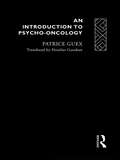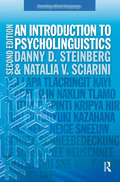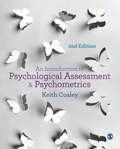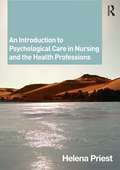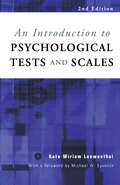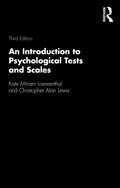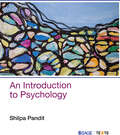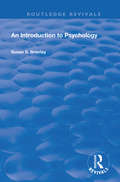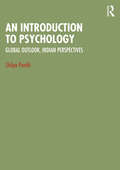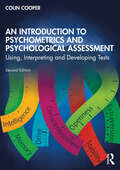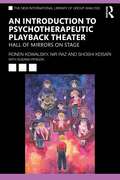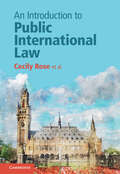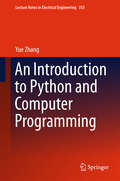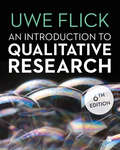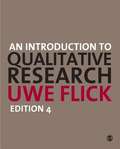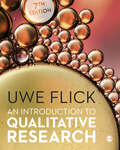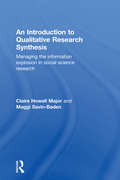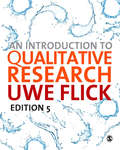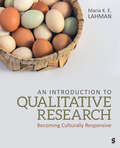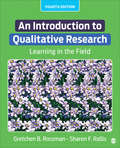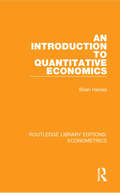- Table View
- List View
An Introduction to Psycho-Oncology
by Patrice GuexCancer is extremely common and in many situations a truly frightening disease, but for too long the psychological aspects and effects have been ignored. An Introduction to Psycho-Oncology deals in a clear and simple manner with the reactions of cancer patients to their illness, and the ways in which they can be helped. In the context of a multidisciplinary approach that takes account of medical treatments as well as psychological interventions, Guex offers suggestions for better ways of communicating so as to provide a therapeutic partnership between carer and client.
An Introduction to Psycholinguistics (Learning about Language)
by Danny D. Steinberg Natalia V. SciariniLearning About Language is an exciting and ambitious series of introductions to fundamental topics in language, linguistics and related areas. The books are designed for students of linguistics and those who are studying language as part of a wider course. Cognitive Linguistics explores the idea that language reflects our experience of the world. It shows that our ability to use language is closely related to other cognitive abilities such as categorization, perception, memory and attention allocation. Concepts and mental images expressed and evoked by linguistic means are linked by conceptual metaphors and metonymies and merged into more comprehensive cognitive and cultural models, frames or scenarios. It is only against this background that human communication makes sense. After 25 years of intensive research, cognitive-linguistic thinking now holds a firm place both in the wider linguistic and the cognitive-science communities.An Introduction to Cognitive Linguistics carefully explains the central concepts of categorizaÂtion, of prototype and gestalt perception, of basic level and conceptual hierarchies, of figure and ground, and of metaphor and metonymy, for which an innovative description is provided. It also brings together issues such as iconicity, lexical change, grammaticalization and language teaching that have profited considerably from being put on a cognitive basis.The second edition of this popular introduction provides a comprehensive and accessible up-to-date overview of Cognitive Linguistics: Clarifies the basic notions supported by new evidence and examples for their application in language learning Discusses major recent developments in the field: the increasing attention paid to metonymies, Construction Grammar, Conceptual Blending and its role in online-processing. Explores links with neighbouring fields like Relevance Theory Uses many diagrams and illustrations to make the theoretical argument more tangible Includes extended exercises Provides substantial updated suggestions for further reading.
An Introduction to Psychological Assessment and Psychometrics
by Keith CoaleyIn An Introduction to Psychological Assessment and Psychometrics, Keith Coaley outlines the key ingredients of psychological assessment, providing case studies to illustrate their application, making it an ideal textbook for courses on psychometrics or psychological assessment.<P><P> New to the Second Edition:<P> * Includes occupational and educational settings<P> * Covers ethical and professional issues with a strong practical focus<P> * Case study material related to work selection settings <P> * End of chapter self-assessments to facilitate students’ progress<P> * Complaint with the latest BPS Certificate of Testing curriculum
An Introduction to Psychological Care in Nursing and the Health Professions
by Helena PriestCaring is at the core of what nurses and other health professionals do. But caring encompasses more than simply looking after people’s physical health needs. People requiring any health service will have psychological needs that affect their feelings, thoughts, and behaviour. Good psychological care can even help improve physical health outcomes. An Introduction to Psychological Care in Nursing and the Health Professions explains and promotes the importance of psychological care for people when they become physically ill, giving a sound theoretical basis to ensure care is evidence-based. It encourages the reader to think about the effects of illness and disability on patients, and to understand what can be done to identify and minimise any difficulties they might be experiencing in these areas. The chapters cover: the meaning and elements of care and holistic care; a model of psychological care in practice; the personal qualities and skills of carers that best underpin psychological care delivery, and how these might be enhanced; the knowledge needed for effective psychological caregiving; psychological care as it might be practised in a range of health care settings. This text contains key learning points, practical activities, reflective exercises and case illustrations. It is ideal for student and practising nurses, and health professionals who would like to improve their care for patients in this essential area.
An Introduction to Psychological Tests and Scales
by Kate Loewenthal Christopher Alan LewisIn its first edition this book successfully enabled readers, with little or no prior knowledge of computing or statistics, to develop reliable and valid tests and scales for assessment or research purposes. In this edition, the author has thoroughly updated the text to include new recent advances in computer software and provide information on relevant internet resources. The book contains detailed guidelines for locating and constructing psychological measures, including descriptions of popular psychological measures and step-by-step instructions for composing a measure, entering data and computing reliability and validity of test results. Advanced techniques such as factor analysis, analysis of covariance and multiple regression analysis are presented for the beginner.An Introduction to Psychological Tests and Scales provides a clear, concise and jargon-free primer for all those embarking in fieldwork or research analysis. It will be an invaluable tool for undergraduates and postgraduates in psychology and a useful text for students and professionals in related disciplines.
An Introduction to Psychological Tests and Scales
by Christopher Alan Lewis Kate Miriam LoewenthalThis text is a vital resource for those with little or no prior knowledge of computing or statistics to aid in the development of reliable and valid tests and scales for assessment or research purposes. It serves as a clear, concise and jargon-free primer for all those embarking in fieldwork or research analysis. The book contains detailed guidelines for locating and constructing psychological measures, including descriptions of popular psychological measures and step-by-step instructions for composing a measure, entering data, and computing reliability and validity of test results. Advanced techniques such as factor analysis, analysis of covariance, and multiple regression analysis are presented for the beginner. This new edition has been revised throughout and includes updated statistical test procedures in line with the new version of SPSS and the inclusion of current academic articles. It serves as an invaluable resource for undergraduates and postgraduates across the behavioral and social sciences, as well as professionals in related disciplines, including those working in management and medical sciences.
An Introduction to Psychology
by Shilpa PanditA comprehensive, inter-disciplinary foundational book on psychology with socio-cultural contexts and practical applications This textbook is specifically designed to provide foundational knowledge to students of psychology. It explains the basic principles of psychology in a clear and accessible manner. It uses examples drawn from real life to provide a context for the theories of psychology. The book is unique in the way it introduces the study of psychology in the context of Indian issues and culture. It integrates indigenous perspectives on topics such as yoga, cognition and health with conventional theories of psychology without compromising on scientific rigour. Each chapter is designed to engage the learners by presenting practical applications of theories as well as relevant stories from Indian and international media. These features along with recent research studies and possible future research questions in the field make Introduction to Psychology an indispensable manual for Indian students of psychology. Key Features: • Examples from the Indian context to make the content more relatable to students • Inter-disciplinary approach which relates psychology to allied subjects like sociology and cognitive sciences • Updated with information about current trends in research in the subject • Follows the curriculum of major Indian universities
An Introduction to Psychology (Routledge Revivals)
by Susan S. BrierleyOriginally published in 1921, this introduction to psychology includes chapters on the definitions and methods related to psychology; organism and environnment; and instinct and intelligence.
An Introduction to Psychology: Global Outlook, Indian Perspectives
by Shilpa PanditThis textbook provides an essential, contextually sensitive and culturally relevant grounding in Psychology that sets the base for future studies. Replete with discussions on current themes and debates in the discipline, its interdisciplinary linkages are relevant in the current times in terms of their contributions and application.This volume addresses the overarching questions of the discipline, with chapters organised to discuss psychological concepts, theories and principles in the light of cultural world views, where culture and the psyche are interdependent. It discusses the indigenous views of self and consciousness as well as contemporary applications of psychology in the global world.This book, designed for a global readership, would be useful to the students and teachers of Psychology, Applied Psychology, and Sociology, and Social Work, Public Health, Gender and Women Studies.
An Introduction to Psychometrics and Psychological Assessment: Using, Interpreting and Developing Tests
by Colin CooperAn Introduction to Psychometrics and Psychological Assessment is the successor to Cooper’s prize-winning book Psychological Testing: Theory and Practice. This expanded and updated volume shows how psychological questionnaires and tests can be chosen, administered, scored, interpreted and developed. In providing students, researchers, test users, test developers and practitioners in the social sciences, education and health with an evaluative guide to choosing, using, interpreting and developing tests, it provides readers a thorough grasp of the principles (and limitations) of testing, together with the necessary methodological detail. This book has three distinctive features. First, it stresses the basic logic of psychological assessment without getting bogged down with mathematics; the spreadsheet simulations and utilities which are integrated into the text allow users to explore how numbers behave, rather than reading equations. Readers will "learn by doing". Second, it covers both the theory behind psychological assessment and the practicalities of locating, designing and using tests and interpreting their scores. Finally, it is evaluative. Rather than just describing concepts such as test reliability or adaptive testing, it stresses the underlying principles, merits and drawbacks of each approach to assessment, and methods of developing and evaluating questionnaires and tests. Unusually for an introductory text, it includes coverage of several cutting-edge techniques, and this new edition expands the discussion on measurement invariance, methods of detecting/quantifying bias and hierarchical factor models, and features added sections on: - Best practices for translation of tests into other languages and problems of cultural bias - Automatic item generation - The advantages, drawbacks and practicalities of internet-based testing - Generalizability theory - Network analysis - Dangerous assumptions made when scoring tests - The accuracy of tests used for assessing individuals - The two-way relationship between psychometrics and psychological theory. Aimed at non-mathematicians, this friendly and engaging text will help you to understand the fundamental principles of psychometrics that underpin the measurement of any human characteristic using any psychological test. Written by a leading figure in the field and accompanied by additional resources, including a set of spreadsheets which use simulated data and other techniques to illustrate important issues, this is an essential introduction for all students of psychology and related disciplines. It assumes very little statistical background and is written for students studying psychological assessment or psychometrics, and for researchers and practitioners who use questionnaires and tests to measure personality, cognitive abilities, educational attainment, mood or motivation.
An Introduction to Psychotherapeutic Playback Theater: Hall of Mirrors on Stage (The New International Library of Group Analysis)
by Ronen Kowalsky Nir Raz Shoshi KeisariAn Introduction to Psychotherapeutic Playback Theater is a comprehensive book presenting Psychotherapeutic Playback Theater as a unique form of group psychotherapy. This pioneering book is the first of its kind, examining this new approach, the theory behind it, and the numerous considerations and diverse possibilities involved in using the technique to promote a significant reflective process among participants. Informed by years of Psychotherapeutic Playback Theater practice and research, the authors detail a collective-creative method that allows for the creation of a therapeutic experience centered on feelings of belonging, acceptance, visibility and liberation. It is presented to the reader as a path toward their development and growth as a conductor working in this newly evolving field of group therapy. The book will be of great interest to dramatherapy students, trainees and professionals, and group therapists who wish to reflect upon their practice through the mirror of Psychotherapeutic Playback Theater as well as facilitators and actors working with Playback Theater or other improvised genres.
An Introduction to Public International Law
by Nico Schrijver Robert Heinsch Cecily Rose Niels Blokker Daniëlla Dam-de Jong Simone van den Driest Erik KoppeWritten for students working in a range of disciplines, this textbook provides an accessible, balanced, and nuanced introduction to the field of public international law. It explains the basic concepts and legal frameworks of public international law while acknowledging the field's inherent complexities and controversies. Featuring numerous carefully chosen and clearly explained examples, it demonstrates how the law applies in practice, and public international law's pervasive influence on world affairs, both past and present. Aiming not to over-emphasize any particular domestic jurisprudence or research interest, this textbook offers a global overview of public international law that will be highly valuable to any student new to the study of this very significant field.
An Introduction to Python and Computer Programming (Lecture Notes in Electrical Engineering #353)
by Yue ZhangThis book introduces Python programming language and fundamental concepts in algorithms and computing. Its target audience includes students and engineers with little or no background in programming, who need to master a practical programming language and learn the basic thinking in computer science/programming. The main contents come from lecture notes for engineering students from all disciplines, and has received high ratings. Its materials and ordering have been adjusted repeatedly according to classroom reception. Compared to alternative textbooks in the market, this book introduces the underlying Python implementation of number, string, list, tuple, dict, function, class, instance and module objects in a consistent and easy-to-understand way, making assignment, function definition, function call, mutability and binding environments understandable inside-out. By giving the abstraction of implementation mechanisms, this book builds a solid understanding of the Python programming language.
An Introduction to Qualitative Research
by Dr Uwe FlickThe definitive guide to the full qualitative research process, from design to dissemination, this is everything you need to understand how good quality research is produced, and how to use and enrich your own work with it. New to this edition: - A new structure follows the research process step-by-step - Brand new chapter on digital methods and social media data explores cutting-edge research - Multi-disciplinary case studies give you real research examples whatever your subject - Focused reading exercises help you explore the literature and build a better bibliography - Integrated online resources, to master the key concepts, discover real research and track your progress An Introduction to Qualitative Research has everything a social science student needs to understand and explore the richness of qualitative research.
An Introduction to Qualitative Research
by Dr Uwe FlickThe definitive guide to the full qualitative research process, from design to dissemination, this is everything you need to understand how good quality research is produced, and how to use and enrich your own work with it. New to this edition: - A new structure follows the research process step-by-step - Brand new chapter on digital methods and social media data explores cutting-edge research - Multi-disciplinary case studies give you real research examples whatever your subject - Focused reading exercises help you explore the literature and build a better bibliography - Integrated online resources, to master the key concepts, discover real research and track your progress An Introduction to Qualitative Research has everything a social science student needs to understand and explore the richness of qualitative research.
An Introduction to Qualitative Research
by Uwe FlickA new edition of this book is available `Flick's An Introduction to Qualitative Research is quite simply the most important text on qualitative research methods in the world today. I continue to envy Flick's command of the field and its ever-expanding literature, much of which he has managed to include in his new edition' - Norman K Denzin, University of Illinois, Urbana-Champaign `Flick aims to please both the novice and the experienced researcher, and in his ambition he largely succeeds. . . . From conceptualizing the field, making sampling decisions to constructing interview guides, Flick offers practical counsel' - Science Direct `Ideal for anyone wishing to understand fully the theoretical constructs behind the qualitative research methodology' - Journal of Family Studies `The inclusion of examples, summary points and further reading is to be commended and adds to the clarity of an already clear and easy to understand text. The strength of the book lies not only in the clarity with which it is written but in the use of examples and tables. . . . I would have no problem in recommending this text equally to both pre and post-registration students of nursing, and also to students studying for higher degrees as a useable text which is easy to read and contains a vast amount of information which is logically presented' - Nurse Researcher This Third Edition of Uwe Flick's bestselling textbook has been fully revised, expanded and updated but retains all of the student-friendly elements and carefully structured qualities of the previous edition. Brand new features include: - Updated discussions and references throughout the text - The integration into all chapters of additional features including chapter overviews, case studies, lists of key points and end-of-chapter exercises - 6 new chapters including a guide to using the book, a chapter on ethics, the uses of literature in qualitative research, an overview of research design, a discussion centred on using documents, and a final chapter on qualitative online research. This new edition will ensure that An Introduction to Qualitative Research preserves its status as the essential introductory text for all students of qualitative research.
An Introduction to Qualitative Research
by Uwe FlickContinuing to be THE guide to the whole qualitative research process for students, this book looks at both the theory behind qualitative research and how to put it into practice in your own work. For students across a range of social science disciplines and beyond, this is a must to help you enhance your research project. This edition introduces: a decolonisation of methodologies a range of indigenous, queer and feminist perspectives on methodologies assistance with defending a viva and alternative forms of assessment to suit a changing world. More additions to this seventh edition include a section on the subjectivity of a researcher, and how your identity will shape your research. The further reading has been curated to include more than just western voices, providing you with global perspectives on qualitative research. This text introduces how to sensitively undertake ethical and inclusive research with marginalised groups. This book will help you master a comprehensive understanding of qualitative research.
An Introduction to Qualitative Research
by Uwe FlickContinuing to be THE guide to the whole qualitative research process for students, this book looks at both the theory behind qualitative research and how to put it into practice in your own work. For students across a range of social science disciplines and beyond, this is a must to help you enhance your research project. This edition introduces: a decolonisation of methodologies a range of indigenous, queer and feminist perspectives on methodologies assistance with defending a viva and alternative forms of assessment to suit a changing world. More additions to this seventh edition include a section on the subjectivity of a researcher, and how your identity will shape your research. The further reading has been curated to include more than just western voices, providing you with global perspectives on qualitative research. This text introduces how to sensitively undertake ethical and inclusive research with marginalised groups. This book will help you master a comprehensive understanding of qualitative research.
An Introduction to Qualitative Research Synthesis: Managing the Information Explosion in Social Science Research
by Claire Howell Major Maggi Savin-BadenProviding a comprehensive guide for understanding, interpreting and synthesizing qualitative studies, An Introduction to Qualitative Research Synthesis shows how data can be collated together effectively to summarise existing bodies of knowledge and to create a more complete picture of findings across different studies The authors describe qualitative research synthesis and argue for its use, describing the process of data analysis, synthesis and interpretation and provide specific details and examples of how the approach works in practice. This accessible book: fully explains the qualitative research synthesis approach; provides advice and examples of findings; describes the process of establishing credibility in the research process; provides annotated examples of the work in process; references published examples of the approach across a wide variety of fields. Helping researchers to understand, make meaning and synthesize a wide variety of datasets, this book is broad in scope yet practical in approach. It will be beneficial to those working in social science disciplines, including researchers, teachers, students and policy makers, especially those interested in methods of synthesis such as meta-ethnography, qualitative meta-analysis, qualitative meta-synthesis, interpretive synthesis, narrative synthesis, and qualitative systematic review.
An Introduction to Qualitative Research: Bachman, The Practice Of Research In Criminology And Criminal Justice 4e + Flick, An Introduction To Qualitative Research 4e
by Dr Uwe Flick\In the new edition of his bestselling book, Uwe Flick introduces all of the main theoretical approaches to qualitative research, and provides unmatched coverage of the full range of methods now available to qualitative researchers. Organised around the process of doing qualitative research, the book guides you through ethics, research design, data collection, and data analysis. <P><P> In this fifth edition, you will find:<P> * a new chapter outlining methodological approaches to qualitative research <P> * new introductory sections at the beginning of each of the book's seven parts, which prepare the ground and define key terms <P> * lots of new practical examples which show you how to carry out all aspects of a qualitative research project <P> * new exercises that give you the opportunity to test your understanding of what you've read <P> * a brand new companion website full of resources for lecturers and students including suggested answers to the exercises in the book, full text journal articles and links to additional resources: http://uk.sagepub.com/flick5e
An Introduction to Qualitative Research: Becoming Culturally Responsive
by Maria K. LahmanThis engaging introduction to all aspects of qualitative research challenges students to consider how their research can be culturally responsive. The first part of the book introduces the foundations including theory, ethics, and reflexivity, with an emphasis on multiple methodologies, from traditional to critical and cutting-edge. The second part covers practical guidance from writing proposals to data collection, and includes a chapter dedicated to creating a culturally responsive relationship with research participants. Finally, readers engage with how the quality of research is enhanced, how data are analyzed, and how research accounts are created and disseminated. Areas vital to the health of qualitative research are addressed including systemic racism and cultural humility, with cutting-edge suggestions offered in areas like hybrid research, harnessing technology, and use of social media. Multiple identities are centered in examples throughout including race, gender, and those who are hard to reach or seldom heard in research. Textboxes featuring scholars, student researchers, and community members invite readers into dialogue in an area that is contested, swiftly shifting, and always vibrant with potential. Resources for instructors are available on a website to accompany the book at: https://edge.sagepub.com/lahman
An Introduction to Qualitative Research: Becoming Culturally Responsive
by Maria K. LahmanThis engaging introduction to all aspects of qualitative research challenges students to consider how their research can be culturally responsive. The first part of the book introduces the foundations including theory, ethics, and reflexivity, with an emphasis on multiple methodologies, from traditional to critical and cutting-edge. The second part covers practical guidance from writing proposals to data collection, and includes a chapter dedicated to creating a culturally responsive relationship with research participants. Finally, readers engage with how the quality of research is enhanced, how data are analyzed, and how research accounts are created and disseminated. Areas vital to the health of qualitative research are addressed including systemic racism and cultural humility, with cutting-edge suggestions offered in areas like hybrid research, harnessing technology, and use of social media. Multiple identities are centered in examples throughout including race, gender, and those who are hard to reach or seldom heard in research. Textboxes featuring scholars, student researchers, and community members invite readers into dialogue in an area that is contested, swiftly shifting, and always vibrant with potential. Resources for instructors are available on a website to accompany the book at: https://edge.sagepub.com/lahman
An Introduction to Qualitative Research: Learning in the Field
by Sharon F Rallis Gretchen B RossmanThe updated Fourth Edition of Rossman and Rallis’s popular introductory text leads the new researcher into the field by explaining the core concepts through theory, research, and applied examples. Woven into the chapters are three themes that are the heart of the book: first, research is about learning; second, research can and should be useful; and finally, a researcher should practice the highest ethical standards to ensure that a study is trustworthy. The Fourth Edition includes an elaborate discussion of systematic inquiry as well as a nuanced discussion of developing a conceptual framework.
An Introduction to Qualitative Research: Learning in the Field
by Sharon F Rallis Gretchen B RossmanThe updated Fourth Edition of Rossman and Rallis’s popular introductory text leads the new researcher into the field by explaining the core concepts through theory, research, and applied examples. Woven into the chapters are three themes that are the heart of the book: first, research is about learning; second, research can and should be useful; and finally, a researcher should practice the highest ethical standards to ensure that a study is trustworthy. The Fourth Edition includes an elaborate discussion of systematic inquiry as well as a nuanced discussion of developing a conceptual framework.
An Introduction to Quantitative Economics (Routledge Library Editions: Econometrics #8)
by Brian HainesOriginally published in 1978. This book is designed to enable students on main courses in economics to comprehend literature which employs econometric techniques as a method of analysis, to use econometric techniques themselves to test hypotheses about economic relationships and to understand some of the difficulties involved in interpreting results. While the book is mainly aimed at second-year undergraduates undertaking courses in applied economics, its scope is sufficiently wide to take in students at postgraduate level who have no background in econometrics - it integrates fully the mathematical and statistical techniques used in econometrics with micro- and macroeconomic case studies.
